
The restless specter of fate rides again in a swamp-born blues, where shadows and prophecy entwine beneath the weight of John Fogerty’s haunted storytelling.
When Creedence Clearwater Revival released “Tombstone Shadow” as part of their 1969 album Green River, the band stood at the peak of their creative momentum. The record itself climbed to No. 1 on the Billboard 200, securing their position as one of the defining American rock acts of the late sixties. Though “Tombstone Shadow” wasn’t issued as a single, its impact within the album is undeniable—it acts as a dark counterweight to the more radio-friendly “Bad Moon Rising” and “Green River.” It’s here, in this track’s thick groove and brooding mystique, that Fogerty channels the murkier undercurrents of Southern blues through the lens of rock’s electric fervor.
The song is built around a taut, driving riff—lean, relentless, and distinctly Creedence. Yet beneath that rhythmic propulsion lies something spectral: a voice reckoning with fate itself. The title evokes both literal and figurative mortality, a “shadow” that follows the narrator wherever he goes. Fogerty, who often balanced his work between mythic Americana and personal introspection, crafts here a modern blues parable—an encounter between man and destiny told in plainspoken language but weighted with symbolic gravity. The “tombstone” becomes not just an emblem of death but a mirror of self-awareness; it is the physical manifestation of consequence, echoing through Fogerty’s gravel-edged vocal delivery.
Musically, “Tombstone Shadow” draws from the primal pulse of the Delta but reimagines it through the band’s swamp-rock signature. Stu Cook’s bass stalks with economy, Doug Clifford’s drums pound like an approaching storm, and Fogerty’s guitar slashes through the haze with wiry precision. The sound is both stripped and cinematic—a collision of raw blues form and rock immediacy that feels timelessly American. This was Creedence at their most elemental: no psychedelic embellishment, no studio excess—just four musicians conjuring menace from rhythm alone.
Within the broader context of Green River, “Tombstone Shadow” deepens the album’s meditation on place and identity. Where other tracks evoke open highways and riverbanks shimmering in memory, this one peers into darker terrain—the psychic swampland where luck runs out and superstition takes hold. It captures that quintessential late-sixties tension between freedom and fatalism, optimism shadowed by uncertainty. In many ways, it prefigures Fogerty’s later preoccupations with accountability and fate—the notion that every choice leaves its trace carved in metaphorical stone.
To listen to “Tombstone Shadow” today is to stand in the twilight between folklore and fact, feeling the grit of Creedence Clearwater Revival’s sound seep into your bones. It remains a reminder that even within rock’s most propulsive moments lurks a deeper reckoning—a blues for every soul chased by its own shadow.